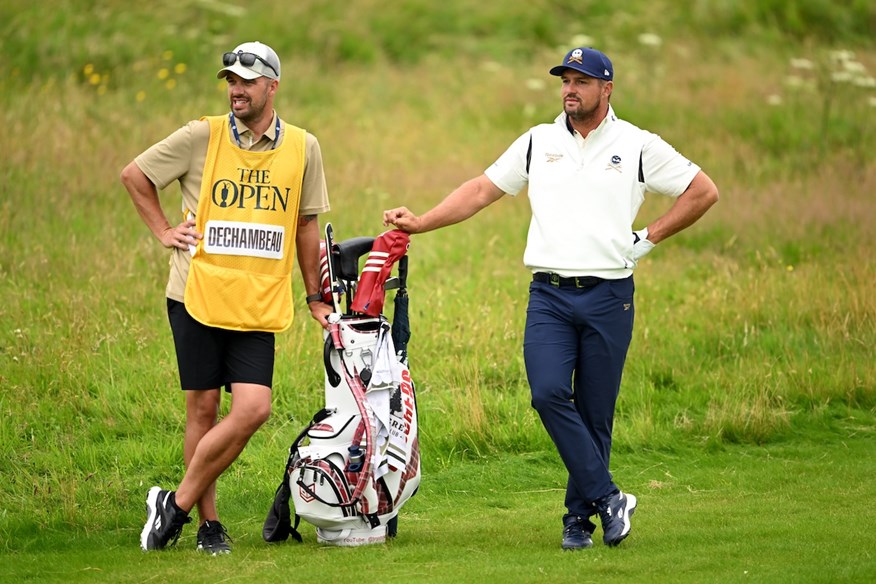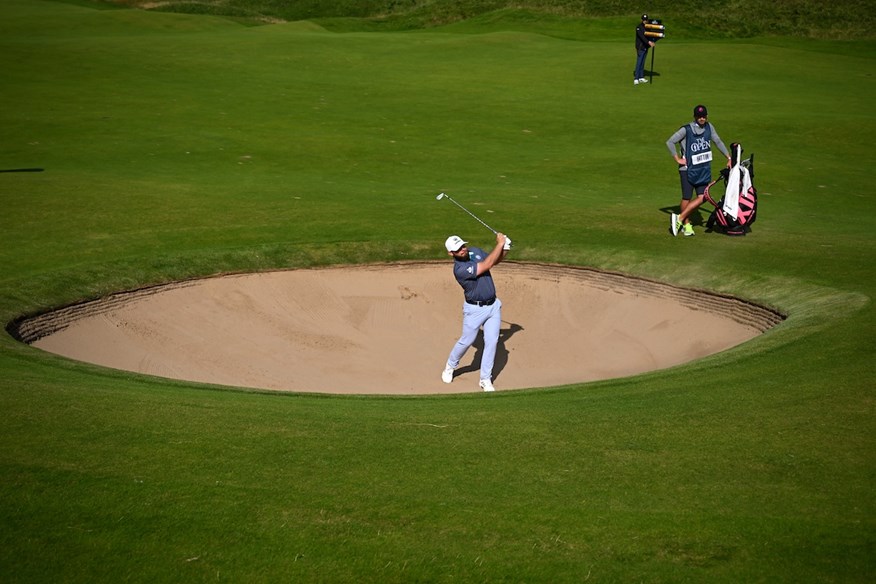It’s been the scourge of the 153rd Open. But Bryson DeChambeau – who else? – has the solution
Published:

Slow play has been a major talking point at Royal Portrush as players clocked in at more than six hours for 18 holes. So we sent Alex Perry to find out if it’s as bad as they’re saying…
“More like How-long Li,” I joke as I nudge my colleague.
A lame joke, but we’ve got to entertain ourselves somehow. We’re stood on the grassy knoll just to the right of the par-3 sixth. But there’s no danger of being hit by any shots here. There aren’t any being fired.
Down to our right, Tyrrell Hatton and Rasmus Hojgaard are striding off down the 7th fairway. In the group behind them, Haotong Li and Brian Harman are still on the 5th green.
It’s hardly a surprise. Both players are notoriously deliberate in the ‘game management’, as they no doubt call it. Preparing for his approach shot at the short par 4, Li strides up to the green, assesses the situation, and marches back down to his ball. All the while, Harman is doing next to no preparation for his own pitch. Only when Li plays his shot does the American begin.
It’s been far too big a story of the 153rd Open to ignore, unfortunately. The championship has been dogged by slow play from the very start.
Sure, the weather has, at times, wreaked havoc at Royal Portrush. As Jon Rahm notes after his third-round 69: “We had a lot of rain come in and out. So umbrellas out, glove out, put the rain gear on, take the rain gear off, give the umbrella to the caddie. It becomes a lot longer that way.”

But it hasn’t rained enough to warrant the six-hour rounds on Thursday and Friday. And Saturday’s conditions have been as good as you can get this close to the ocean.
“It’s usually very much related to the amount of players in the field,” Rahm ventures. “When you have 150-plus the first two rounds, every single major – except the Masters, obviously – is going to be longer rounds. It’s just what it is.
“I think there are so many players and there are so many opportunities where the game can get delayed. You can reach the second hole. You can reach five, [where] you can let them finish or they’re going to wave [you] up. You can reach 7. You can reach 12. Then [there are] plenty of holes like 16, where things can get lengthened. That’s just going to happen. It’s the flow of the game.
“There’s very little you can do to make those rounds a lot shorter. That’s just the nature of the game.”
Of course, the Spaniard can’t resist a little promotion in his response.
“It’s a bit of an adjustment after playing in LIV because we absolutely fly,” he says.
“I feel like every round is less than four and a half hours. It is an adjustment when you get to play a six-hour round, but I also know it’s going to happen. So [you] talk to your caddie, talk to your playing partners. While there’s nothing you can do [but] just try to keep your mind engaged in something else but the game. Just not be thinking [about] what you’re going to do. Just distract yourself a little bit and basically lock back in when it’s time.”
The R&A are not entirely blameless in all of this. The organization’s new CEO confirmed in his first Open press conference on Wednesday that caddies would be raking bunkers at Portrush this week. Traditionally, each group has had a designated rakesmith provided by the British and International Golf Greenkeepers Association.
“It’s a change for us – but we think a good one,” Darbon said.
Tommy Fleetwood isn’t on board. “I thought that was a bit odd,” he noted after his opening round on Thursday, before saying he had been left with a “harsh” lie in one trap that had not had enough care and attention.

Back to Saturday, and Tyrrell Hatton has just hoiked his ball out of the fairway bunker on the right-hand side of the 9th fairway. He walks up to the green and begins assessing his 23-foot birdie putt. But his bagman, Hugo Dobson, is nowhere to be seen. That’s because he’s still raking the sand. And now a stream of spectators crossing the fairway have separated him from his boss. Speaking to people on the ground, it’s not the first time this completely unavoidable scenario has happened.
And, of course, Bryson DeChambeau had to get caught up in all the drama when he was put on the clock – at the 17th of all places. He blamed the difficulty of the par-3 16th and the fact that the penultimate hole sweeps dramatically downhill to the green, so he wanted to wait until the path was definitely clear before hitting his drive. “I was moving my butt as fast as I could!” he jokes in his post-round media huddle.
But this is DeChambeau, so he absolutely has an idea on how to fix it.
“It’s very simple,” he says, before reiterating his point: “It’s not difficult at all.”
He continues: “You time everybody for their whole entire round. Very simple. Nobody wants to do it, because people are too scared to get exposed, which I am an advocate for. I’d love to be timed, and I have no problem with that.
“My putting, I’m more deliberate, take more time on that, but when it comes to iron shots, off the tee, I’m pretty fast. Everybody plays a different style of game, and that’s just the way it is. I wish it was just a new system.”

Hypothetically, though, how does he see that working?
“Well, I think it would be more fair towards everybody,” he says. “If somebody is playing slower, the [referee] can go up to him and say, ‘Hey, man, you’re over par with your time.’ All you do is you just time them for every single shot. He gets there and puts the bag down, and how long it takes him to hit that shot and how long it takes him to walk to the green. It’s not rocket science.
“You time how long someone takes individually, and then you separate that from the other person playing. You start-stop on him the whole entire [round]. It’s one way. I’m not saying it’s the answer. I’m definitely not somebody that has the most experience or knowledge on it [but] once you start penalizing individuals for taking too much time…”
DeChambeau shrugs as he pauses to remember the carnage of Thursday and Friday.
“I can tell you, first two rounds it was out of control what I saw,” he continues. “That’s the way people play. Long story short – one day I hope we can have a better system.”
Something needs to be done. Otherwise we’re in danger of it becoming the Slow-pen Championship, amirite?
Hello? This thing on?
Tough crowd.
- Why Scottie Scheffler’s 54-hole lead makes frightening reading for the chasing pack
